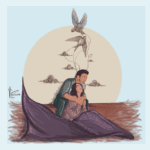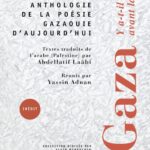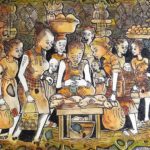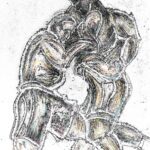Translator’s Note: Kagay-an and a Love in the Time of an All-Out War (2018) unfolds in the early 2000s, during former president and kleptocrat Joseph Estrada’s “all-out war” against Islamic separatists and communist insurgents in the Philippine south. At the heart of this autobiographical novella is a young bayot (trans femme), born out of wedlock in a rural barrio on the edges of Cagayan de Oro, a burgeoning southern metropolis that houses a US Air Force base since the 1930s. Through her eyes, the story weaves a tender yet unflinching exploration of sexual awakenings, trans femininity, and the interplay of loss, ethnopolitical strife, and land. Her journey of self-realization confronts her queerness, working-class roots, and indigeneity, all while resisting a feudal, militarized state that loomed large over the ancestral lands of Lumad, or indigenous peoples, like the Higaonon. Amid the critical backdrop of extrajudicial killings and relentless civilian surveillance, Kagay-an becomes both a personal odyssey and a political commentary, echoing the struggles of marginalized communities—indigenous peoples and farmers—against the expanding urban middle-class, Christianized settler majoritarian state. As Alvarez-Brüggmann reflects years later: “Writing Kagay-an was an act of paying homage to my hometown, Cagayan de Oro, and to Lualhati Bautista’s ‘GAPÔ.” A Künstlerroman, the novella can be read as a bibliomemoir, drawing parallelisms with Bautista’s war novel set in the northern Philippine city of Olongapo.
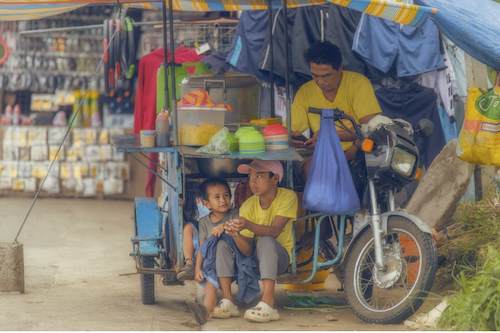 A small roadside food stall operates out of a motorized tricycle with two children
A small roadside food stall operates out of a motorized tricycle with two children
waiting by as their father prepares street food for customers.
Pagbilao, Quezon, Philippines, 2024. Photo: AJ Luna
CHAPTER 6
I was assigned on the morning shift. Four o’clock meant I was free. On my first day at the summer job, the supervisor pointed me to the fast food’s dining area. I nodded, no hesitation. Yes, of course, yes. The dining area meant proximity. Proximity to the bookstore right across the street.
By late afternoon, the sunlight thinned, a veil levitating over the bookstore’s red signage. Soon, I would be free. A few steps, and I’d cross over. I inhaled, catching a whiff of gravy and fried chicken, the smell sticking to my skin like some kind of invisible badge.
Inside the bookstore, I wandered like a thief. Five minutes, perhaps. My fingers grazed the spines of books, pausing to choose school supplies. I flipped through drawing books. Ballpoint pens, blue, black, and red, rolled through my hand, testing their flow. I let colorful pencils tap against the white paper. And then, as if drawn by some unseen pull, I found myself in the Religion Section. Lualhati Bautista’s ‘GAPÔ lay where I had left it, nestled alone among the most sacred books. I smiled. Most sacred.
My hand hovered over a Bible. Why had I never read it? We had one at home. I think almost everyone does. I was baptized a Christian, but I had never read the holy scriptures. Guilt hit me harder when I opened the page. The Ten Commandments stared back. The seventh, bold and unblinking: Thou shalt not steal!
Ginoo ko, pasayloa ko. My whisper pleading for divine forgiveness. I shut the book with a soft thud and hurried out of the bookstore. I crossed the street quickly to catch a jeep heading home. A barker’s voice cutting through the darkness hovered above me.
“Carmen! Carmen! Carmen! Duha pa! Duha pa! Sibugi ang tuo. Sibugi ang wala.” Two seats left. Two passengers needed. I climbed in, took the last seat, and closed my eyes.
But the unknown pull was relentless. The jeepney lurched forward, and I bolted upright.
“Hoy! Asa man ka?” the jeep’s conductor called after me as I jumped out, his voice dissolving into the night.
At a red light, I darted across the street. Back inside the bookstore, ‘GAPÔ was buried under a pile of Bibles, waiting. I slid it free. To the left, the Self-Help section full of promises: The New Technique of Achievement, The New Mood Therapy, Don’t Sweat the Small Stuff, The Art of Happiness. I opened ‘GAPÔ. Chapter 6 was ripped clean, folded into the crumpled table napkin, and slipped deep into my pocket. Outside, the fast-food mascot greeted me with its perpetual grin. It knew my secret. And I smiled back.
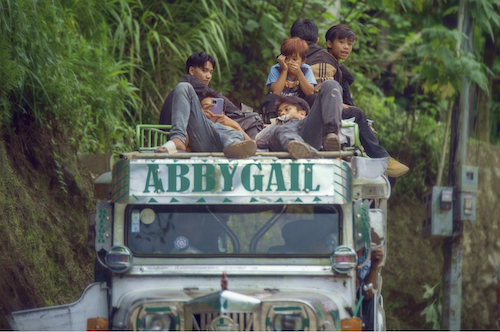 Topload passengers ride on a jeepney from a rural area. Jeepneys, originally made from surplus US military jeeps after World War II, are the Philippines’ most popular means of public transportation.
Topload passengers ride on a jeepney from a rural area. Jeepneys, originally made from surplus US military jeeps after World War II, are the Philippines’ most popular means of public transportation.
Hungduan, Ifugao, Philippines, 2024. Photo: AJ Luna
~
I went through Mama’s things with furtive hands. In ‘GAPÔ, I had read about Magda, a character obsessed with anything American, her stubborn loyalty to imported, stateside groceries even as her pay as a hostess ran dry. The picture of the GI emerged. On its back, his handwriting: his name, age, and an address that felt far away. Below that, Mama’s introduction. She called herself a Filipina and her age bracket circled: 30-40. Looking for a husband, she wrote, not just a boyfriend.
Mama’s friend, the sundry store owner, had helped draft the letter. Attached to it was Mama’s full-body picture. A bonus image showed her in a bathing suit, smiling against the backdrop of some beach resort, a Christmas party she once attended with a policeman she briefly loved. She wasn’t the only one chasing this dream of escape. It wasn’t just a personal desire. It was sort of a social movement, a shared prayer that gathered them together every Sunday. They called it a “prayer meeting.” But really, it was kind of a writers’ workshop for love letters to their American pen pals.
And at the center of it all, the sundry store owner stood as their role model, their proof of success. She, who once balanced on the edge of a 5-6 loan from an Indian moneylender, now owned a bungalow. The sundry store, once cramped and dusty, had transformed into a small empire. Retail goods had given way to bulk supplies: sacks of rice, cartons of noodles and canned goods, crates of soda, and alcoholic beverages stacked high like monuments to her triumph. The “credit is good, but we need cash” sign had long since disappeared, replaced by a new mantra whispered by her American husband: “No cash, no transaction.” But even here, in the mythology of aspirations in this barrio, there were barters and bargains. Debts that couldn’t be paid in cash were settled with sacks of vegetables, baskets of fruit, or the occasional livestock like chickens, goats, once even a scrawny pig. Dogs and cats, though, weren’t up for trade.
Mama’s friend had done extraordinary things already, things that made the villagers talk about her with admiration. Some said she should run for barrio councilor. They said it with a grin, but knowing full well, she could fix what others had let rot. She had taken the leftover cement and hollow blocks from the renovation of her sundry store and handed them over to the barrio’s preschool center. The cracks in the walls and the gaps in the floor were filled. She had the rusty roof replaced, too, restoring the brittle hope that show up every election season when promises piled up higher than bricks and came crashing down right after a winner was declared.
She gave, always. Sponsorship for the youth basketball and volleyball leagues during the summer and fiestas in the form of cash prizes. Cans of biscuits, packs of coffee, and a handful of candles for the grieving family. During wakes, she strung a flying wire from her house to provide light. Not much, but enough to hold back the dark.
But come New Year’s Eve, she skips the calendars for her customers. What’s the use of a glossy calendar adorned with the Holy Infant Jesus or the Blessed Virgin Mary if it doesn’t even say VIRGINIA STORE? Instead, her customers received small bags: three packets of pancit and misua noodles, two tins of sardines, a kilo of rice.
She spoke often of her US green card, of leaving the business to her parents. America had her attention now. Not the store, not the sports competitions, not even the five hectares of land her family had clawed back from debt collectors. America. The name heavy in her mouth, a destination and salvation. She’d mortgaged the land once, back when she was singing in a bar down Ermita in Manila. That was where she met the white American man. When she succeeded, she paid off everything, even her parents’ debts.
I thought of Mama, her parents free from any debt to prepare her for this life. It wasn’t their duty, it was fate’s. Fate owed them, owed her. Owed for the soldiers who took her father. But when I asked Mama about it, she said none of this was for her. It was for me, for my future. My chest ached for Tatay, for the life he could have had. If he were still here, I thought Mama wouldn’t be chasing America in a white man’s promise. But she swore she’d never leave me. When the GI would come for her, she’d take me, too. Even then, I told her we should wait. Wait for Tatay. Because Tatay was coming back.
A few months later, the postman showed up while I was home alone. The letter he held had a foreign stamp with Mama’s name scrawled across the front. He was familiar with Mama’s home service routes, so he handed it over to me without a word.
The letter was from an American man. He wanted to come to the Philippines to meet Mama. To see her face. I didn’t know what to make of it. I slipped it into my textbook and carried it with me to school every day, reading it over and over, like some sacred text. And every word brought more questions. Should I write back? And if I did, what would I say? That Mama was happy with her son and the smallness of her days? That she didn’t care to remember? Or, God forbid, should I say what my mind dared to imagine? That Mama whom he longed to see was already a ghost.
That afternoon, it was my group’s turn to clean the classroom. We swept the dust and polished the floor. The others left after we finished, but I chose to stay. The letter was still there, tucked where I’d hidden it. I pulled it out, stared at the words one last time, and crumpled it in my palm. A small satisfaction, but not enough. So I tore it into pieces, smaller and smaller, until it was nothing but tiny scraps. I let them flutter into the trash bin.
That night, I couldn’t sleep. Even with the letter gone, it felt like I was still holding it. Should I tell Mama? Should I let her know?
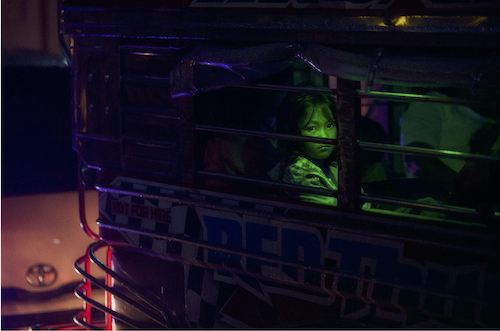 A child peers out from inside a jeepney in the dim glow of city lights.
A child peers out from inside a jeepney in the dim glow of city lights.
Pagbilao, Quezon, Philippines, 2023. Photo: AJ Luna
Alton Melvar M. Dapanas
Author’s Bio: Stefani J. Alvarez-Brüggmann (she/her) is an alumna writer-in-residence at the Akademie Schloss Solitude in Stuttgart, Germany. A trans migrant worker, she lived in Jubail and Al-Khobar, Saudi Arabia, from 2008 to 2022. Her prose collection Ang Autobiografia ng Ibang Lady Gaga (VisPrint, 2015) won at the National Book Awards in the Philippines, while her autobiographical novella Kagay-an at Isang Pag-Ibig sa Panahon ng All-out War (Psicom, 2018) was a finalist. Translated into English by Alton Melvar M Dapanas, Stefani’s works have been featured in magazines, small press fairs, journals, book festivals, art exhibits, and anthologies in New York, Beirut, London, Taipei, Chicago, Helsinki, Berlin, Macau, Paris, and Dublin. Her latest books include Ang Liwayway at Sandekadang Mga Dagli (8Letters, 2024) and mula sa Dear Sol (Aklat Ulagad, 2024). She divides her time between Würzburg, Germany, and her hometown of Cagayan de Oro, Philippines. Visit her website here.
Translator’s Bio: Alton Melvar M. Dapanas (they/them) is an essayist, poet, and translator from the southern Philippines. They are the author of M of the Southern Downpours (Downingfield Press, 2024), In the Name of the Body: Lyric Essays (Wrong Publishing, 2023), and Towards a Theory on City Boys: Prose Poems (Newcomer Press, 2021). Their works have been published globally, from South Africa to Japan, France to Singapore, and translated into Chinese, Damiá, and Swedish. Their writings have appeared in World Literature Today, BBC Radio 4, Michigan Quarterly Review, Sant Jordi Festival of Books, and the anthologies Infinite Constellations (University of Alabama Press) and He, She, They, Us: Queer Poems (Pan Macmillan UK). Currently an editor-at-large at Asymptote and formerly with Creative Nonfiction magazine, they have been nominated to The Best Literary Translations and twice to the Pushcart Prize for their lyric essays. Read their work here.
Photographer’s Bio: AJ Luna (b. 1988) is a photographer from Pagbilao, Quezon Province, Philippines. His visual artworks have been exhibited in the Ayala Museum, BenCab Museum, Parola Gallery of the University of the Philippines - College of Fine Arts, Orange Gallery, White Space Gallery, Museo ng Pag-asa, and Museo ni Jesse Robredo of the National Historical Commission of the Philippines. Luna’s works have also been featured in art books like Kwento Engkwentro (2020), Para sa Bukas na Kulay Rosas (2022), Panahon ng Paru-paro (2022), and Tayo ang Liwanag (2023). Follow him on Instagram @ajfudge.
